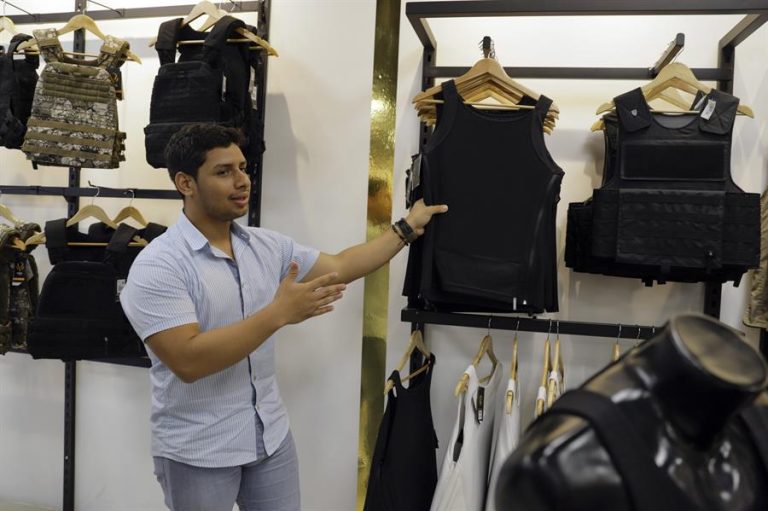
Murder spurs Security Business!
By Claudia Polanco Yermanos
Guayaquil, Ecuador, Jan 18 (EFE).-
The murder of prosecutor César Suárez on Wednesday afternoon in Guayaquil is just the tip of the iceberg of the violence Ecuador is facing. One person dies every 69 minutes due to insecurity, making the armoring of clothes, vehicles, homes, and offices a growing need for feeling safe. In 2023, the homicide rate per 100,000 inhabitants increased by 300%, and the total number of homicides reached an all-time high of 7,878, of which only 584 were solved, according to the German statistics portal Statista.
The latest victim is Suárez, who was investigating the Jan. 9 hostage-taking at public broadcaster TC Television by the criminal gang “Los Tiguerones,” among other corruption cases. Authorities said the prosecutor was traveling alone without a bulletproof vest in a white van when he was shot twenty times.

Bulletproof clothing
Considered “the most violent country in Latin America” by the Ecuadorian Organized Crime Observatory, it is not surprising that the bulletproof business is booming.
“Last year we sold 6,500 bulletproof vests, and the projection is to sell 10,000 by 2024,” Christopher Eggeling, CEO of Globalsegupro, owner of the Eggeling Armored brand, told EFE.
In its production plant in Quito, the company uses cutting-edge materials imported from the United States and Europe, such as Dyneema and Kevlar.
These materials are the most resistant fibers in the world. In addition to being bulletproof, these fibers are resistant to high temperatures and chemical exposure.
“It is natural to want to protect oneself in the face of the insecurity we suffer daily,” assured the businessman, who explained that the price of the vests ranges between $280 and $1,300, depending on the level of protection they offer.
The National Institute of Justice of the United States established the armor standard, which at the lowest level, known as IIA, is able to stop 9-millimeter bullets and full metal jackets. This standard goes up to level IV, which is effective against 7.62-millimeter and even 30-caliber bullets.

Bulletproof fashion
In August 2023, images of then-presidential candidate Daniel Noboa attending a debate wearing a dark suit, tie, and bulletproof vest stirred up controversy. Since then, other candidates have followed in the footsteps of the current Ecuadorian president, who visited the facilities of the TC television channel on Jan. 12 to show solidarity with the staff who suffered the attack by the armed group.
He was wearing a black T-shirt and, underneath, a sleeveless T-shirt with level IIIA armor, which provides lateral ballistic protection for vital organs (its price ranges from $1,300 to $1,545).
The demand for garments similar to bulletproof clothing has increased by 35% in Guayaquil and 15% in Quito at Police Tactical Equipment.
This brand specializes in tactical equipment and footwear. It distributes the Colombian brand Miguel Caballero, known as the “tailor of armored fashion.”
“The most requested item is the tank top, as it is something discreet that allows executives, businessmen, and politicians to feel safe,” explains the company’s administrative director, Rubén Camba.
Bunker on wheels
The concern in Ecuador makes it “normal” to quote for the armoring of windows and doors for homes and offices, trying to turn vehicles into bunkers on wheels.
Proof of the escalation of violence is that “in 2022, the company armored 40 vehicles. In 2023, there were 160, and only in January this year 30 services have been confirmed,” explained Fernando Sánchez, general manager of AutoExpress.
Far from ceasing, the gang wars in Ecuador have opened up a new line of business in bulletproof vests and clothing.
cpy/dgp/ics


